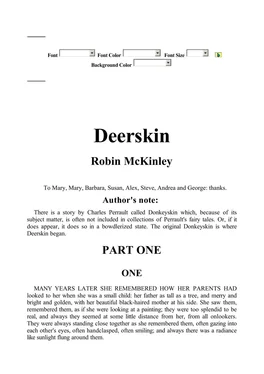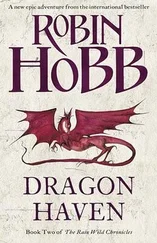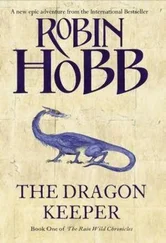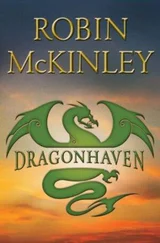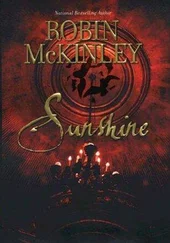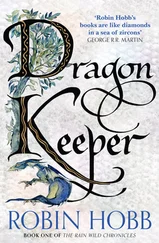Deerskin - Robin McKinley
Здесь есть возможность читать онлайн «Deerskin - Robin McKinley» весь текст электронной книги совершенно бесплатно (целиком полную версию без сокращений). В некоторых случаях можно слушать аудио, скачать через торрент в формате fb2 и присутствует краткое содержание. Жанр: Старинная литература, на русском языке. Описание произведения, (предисловие) а так же отзывы посетителей доступны на портале библиотеки ЛибКат.
- Название:Robin McKinley
- Автор:
- Жанр:
- Год:неизвестен
- ISBN:нет данных
- Рейтинг книги:4 / 5. Голосов: 1
-
Избранное:Добавить в избранное
- Отзывы:
-
Ваша оценка:
- 80
- 1
- 2
- 3
- 4
- 5
Robin McKinley: краткое содержание, описание и аннотация
Предлагаем к чтению аннотацию, описание, краткое содержание или предисловие (зависит от того, что написал сам автор книги «Robin McKinley»). Если вы не нашли необходимую информацию о книге — напишите в комментариях, мы постараемся отыскать её.
Robin McKinley — читать онлайн бесплатно полную книгу (весь текст) целиком
Ниже представлен текст книги, разбитый по страницам. Система сохранения места последней прочитанной страницы, позволяет с удобством читать онлайн бесплатно книгу «Robin McKinley», без необходимости каждый раз заново искать на чём Вы остановились. Поставьте закладку, и сможете в любой момент перейти на страницу, на которой закончили чтение.
Интервал:
Закладка:
"The king's city?" And again the word king made Lissar want to look behind her, throw pebbles in the shadows to see what would be flushed out.
Barley ran his hand over his head. "I haven't been there in thirty years. There isn't enough grass there, and too many people, and the vegetables ain't really fresh, even in summer. What do you want with the city?-Wait," he added hastily, "I'm not asking, it's just my way of talking. I ain't used to anybody who ain't used to me. It took us, well, near a month to get there; but the wheel-horse threw a shoe and went lame with it, and we lost a few days. The roads are better now; it's one of Cofta's pet projects, the road system."
"Cofta?" said Lissar before she thought to stop herself.
The other two stared at her. "King Cofta," Barley said, after a moment. "It's his city you're wanting." Lissar looked up from the table, through the unshuttered window, where sunset still kept the darkness at bay. The entire world was rose-colored with this day's end, the same rose color as the hangings of a small round room.
"Ah, well," Barley went on, "both of us know from listening to you that you ain't from around here." The pause this time was anxious, trying not to be expectant and failing.
"No," said Lissar. "I'm from ... a place beyond the mountains."
Barley hastened into the pause that followed this statement. "You might never have heard of our king as Cofta anyway, for he's King Goldhouse the Seventeenth; but they've all been Goldhouses, all seventeen of them in a row, and Ossin will be Goldhouse the Eighteenth when his time comes.
"Their great house is yellow brick, and the door is covered with gold leaf, and the creatures carved into the arch of it have golden claws and eyes and tail-tips. Most of the town is built of the same brick, so it's called the yellow city, although there ain't any other gold except the door-handle of the guild hall, where there's always a doorkeeper, just like at the king's door."
Lissar declined her hosts' repeated offer of the mattress, or a return to the warm haystack. She was tempted, for the weariness the bath had awoken deep in her bones was still strong. But she felt that she had lost the knack for sleeping under a roof, and that, now she knew the name of the place she had chosen as her goalthe king's city, the yellow city-she wanted to keep on toward it as steadily as she could.
"Come see us if you come back this way," Ammy said hopefully.
"I will," Lissar said, surprising herself by meaning it.
It was full dark as she and Ash stepped onto the road again-with two loaves of bread, tied up in a kerchief, under one arm, for Ammy had won that argument-and fell into their familiar loping pace, Ash silent at her left side. The weariness, strangely, dropped from her as they ran, as she breathed deeply of the cool night air.
SEVENTEEN
LISSAR WAS MORE WARMED AND SHAKEN BY HER ENCOUNTER with Ammy and Barley than at first she realized. She often remembered the sound of their voices, the words they used, words a little different from the ones she or Rinnol would have chosen, and differently pronounced. But she rolled the sound of their voices around in her head like coins in the hand. And she decided, without ever deciding, that she would continue travelling by night..It was too important a matter, this talking to people, and listening to them, to do it lightly or often.
The weather grew warmer, both, she thought, as they came farther and farther from the mountains, and as spring progressed toward summer. There were the first pale shoots of witchgreen growing by the streams they camped by, tender and sweet, and nothing like the huge dark intensely bitter leaves the same plant would have produced by midsummer. Lissar risked tastes of plants she did not know but that looked and smelled plausible; one of her guesses gave her a day of belly cramps, but the rest were good, and provided some welcome variety. Nothing was as good as Ammy's rabbit stew however, and her bread was gone far too soon.
But the morning came when they could find no wildness to retreat to, not even any semi-cultivated hedgerow to sleep under. The road had grown wider and wider yet, and there was traffic on it sometimes even at night, though when anyone hailed her she merely raised a hand in acknowledgement and kept on. At night, usually, other travellers were in a hurry, bent too urgently on their own business to take much note of who shared the road with them. Once, one twilight, someone's dog had leaped off a wagon and tore after them, barking briefly in a businesslike manner that Lissar did not like; it was big and black and it ran like it was nobody's fool. But before she had done anything but touch her stone-pocket, Ash had turned and hurled herself silently on their pursuer. Something happened, very quickly, and the other dog fled, howling like a puppy. Lissar barely had had time to break stride. She paused, but Ash gave her a look as if to say: why do you bother?-and Lissar thought perhaps she did not want to enter into a conversation with the men on the wagon who were-she glanced at them-staring at her and Ash with their jaws visibly hanging.
So they ran on.
As the days grew longer it was no longer possible only to travel in the dark hours; she would waste too much time, and she was impatient to reach the city she had chosen as her destination. Farmers' dogs occasionally chased them but were careful not to get close: I am merely, they barked, announcing that this is my territory; I have no quarrel with you so long as you continue on your way.
She had not expected to come to the city so soon. Perhaps it had, in the last thirty years, since Barley's journey, reached out to meet him-and got her instead. Dawn was growing, pink and yellow and long streaks of pale orange, and she and Ash were tired, but she saw nowhere for them to rest in hiding. She had been careless; she had grown accustomed to running along a straight and easy road every night, with no decisions to make but which field looked a likely place to find dinner. She had grown accustomed to the steady increase of houses, and the occasional village spilling out from the road like groundwater filling a footprint. But the villages had been small and farmland began again on their other side, and with farmland, small wild groves and untitled meadows.
The first time they came to a town center where there were no fields at all, and the buildings were all attached to each other, as if the road had high thatched walls with shuttered windows in them, she had stopped in amazement. She felt she had run into another world, where the people must be visibly alien, with mouths at the top of their faces, or eight fingers on each hand. But that piece of the road was quite short-she paused to peer down a side-road, similarly lined with unbroken wood and stone-and they soon ran through it and out into the open land again. She realized that farmland now looked almost as familiar to her as unbroken forest once had.
Maze, she thought, thinking about the building-walled town. There was a maze, once, in a garden where I walked, with hedges high and clipped close. You were supposed to find your way into the center and back out again. I went there with Viaka. But with the name Viaka, her memory shut down again, and she thought no more about the town.
Dawn was now morning, and there were more and more other people on the road.
She and Ash had to slow to a walk, partly because it would be too awkward, and partly too conspicuous to thread their way through the throng at a more rapid pace; people on foot walked. Horses and carriages moved more quickly. But partly also it was from weariness. They had nothing to eat; it was not unusual to miss a meal, but to have the prospect of neither food nor sleep was hard. Ash's tongue was hanging out.
At least we can find water, thought Lissar. Somehow. I hope. But Lissar had not taken into account town hospitality; soon they came to a wide low watering-trough by the roadside, set next to a well. A woman was there already, watering her horses by pouring bucket after bucket into the cistern. Ash stepped up beside her and lowered her head.
Читать дальшеИнтервал:
Закладка:
Похожие книги на «Robin McKinley»
Представляем Вашему вниманию похожие книги на «Robin McKinley» списком для выбора. Мы отобрали схожую по названию и смыслу литературу в надежде предоставить читателям больше вариантов отыскать новые, интересные, ещё непрочитанные произведения.
Обсуждение, отзывы о книге «Robin McKinley» и просто собственные мнения читателей. Оставьте ваши комментарии, напишите, что Вы думаете о произведении, его смысле или главных героях. Укажите что конкретно понравилось, а что нет, и почему Вы так считаете.
